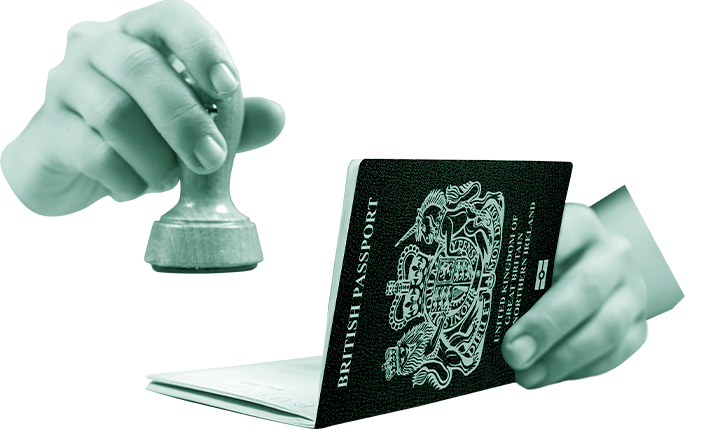Let's Talk

Need Help Urgently?
Call our 24 hour rapid response team now on 0333 311 1090
Request a callback
"*" indicates required fields


An immigration audit is a process that helps organisations ensure compliance with immigration rules and regulations. It involves reviewing policies, procedures, and sponsorship records to identify areas for improvement and ensure that the organisation is following the correct protocols. The aim of an immigration audit is to prevent illegal working and ensure that the organisation’s HR systems are accurate and up to date.
The Home Office, which is responsible for immigration enforcement in the UK, conducts compliance visits to organisations to ensure that they are complying with their sponsorship duties. These visits are unannounced audits that can happen at any time and without warning.
During a compliance visit, Home Office officers evaluate various aspects of the organisation, including the information supplied to the Home Office, the ability to offer positions at the required skill level, compliance with salary requirements, and adherence to recruitment processes and resident labour market tests.
It is important for organisations to undergo regular immigration audits to ensure compliance and mitigate the risk of penalties or license revocation. By identifying areas of non-compliance and implementing necessary changes, organisations can proactively address any issues and maintain a compliant immigration status.
Using an independent auditor for immigration audits can provide several benefits for organisations.
An independent auditor is a third party who specialises in conducting compliance audits and can
offer objective and unbiased assessments of an organisation’s immigration compliance.
Compliance issues related to immigration can be complex and constantly evolving. By engaging an
independent auditor, organisations can benefit from the expertise and experience of professionals who are knowledgeable about the latest immigration rules and regulations. Independent auditors have a deep understanding of the immigration process and can identify any potential compliance issues that may arise.
An independent auditor can also provide valuable advice and recommendations for addressing compliance issues. They can help organisations establish best practices, streamline processes, and ensure that HR systems are accurate and up to date. By working with an independent auditor, organisations can demonstrate their commitment to compliance and reduce the risk of penalties or license revocation.
Furthermore, using an independent auditor can enhance an organisation’s reputation. By conducting
regular audits and maintaining compliance, organisations can demonstrate their commitment to ethical business practices and responsible immigration management. This can contribute to building trust with employees, clients, and stakeholders.
Employers have various obligations when it comes to immigration compliance. These obligations are in place to ensure that organisations are following immigration rules and regulations and are actively preventing illegal working.
One of the key obligations for employers is the prevention of illegal working. Employers are required to conduct right to work checks on all employees to ensure that they have the legal right to work in the UK. This includes verifying identity documents and ensuring that they are genuine and valid.
Employers must also keep accurate records of these checks for all employees. Employers are also responsible for maintaining accurate HR systems. This includes keeping up-to- date records of employees’ immigration status, tracking visa expiry dates, and ensuring that any necessary visa extensions or renewals are applied for in a timely manner. HR systems should also include processes for monitoring and reporting any changes in employees’ immigration status.
In addition to these obligations, employers must comply with the specific requirements of the sponsor license they hold, if applicable. This includes maintaining accurate records of sponsored employees, complying with reporting duties, and ensuring that sponsored employees are working in the roles and locations specified in their certificates of sponsorship.
By fulfilling these obligations, employers can demonstrate their commitment to immigration compliance and minimise the risk of penalties or license revocation.
There are several reasons why organisations should carry out regular immigration audits. First and foremost, an immigration audit helps ensure compliance with immigration rules and regulations. By conducting an audit, organisations can identify any areas of non-compliance and take necessary actions to rectify the situation. This proactive approach can help organisations avoid penalties, license revocation, and reputational damage.
Another reason to carry out an immigration audit is to seek legal advice. Immigration laws and regulations can be complex and constantly evolving. By consulting with immigration experts, organisations can ensure that they are up to date with the latest requirements and best practices.
Legal advice can also help organisations navigate any potential compliance issues and provide guidance on how to address them. An immigration audit also serves as a preparation for Home Office compliance visits. By conducting an internal audit, organisations can identify and rectify any compliance issues before they are discovered by the Home Office. This preparation can help organisations present a strong case to the Home Office and demonstrate their commitment to compliance.
Overall, carrying out an immigration audit is a proactive and responsible approach to immigration compliance. It helps organisations maintain a compliant immigration status, reduce the risk of penalties or license revocation, and ensure adherence to immigration rules and regulations.
Home Office compliance inspections are thorough reviews to ensure businesses comply with immigration rules. They assess record-keeping, worker immigration status, and adherence to sponsor duties. If a company fails, penalties can include fines, loss of sponsor licence, or imprisonment. These inspections demand full compliance and necessitate a proactive approach to prevent issues. Conducting regular mock audits and maintaining accurate records can help companies prepare for and pass these stringent Home Office checks.
During a Home Office inspection, compliance officers visit an organisation's premises to evaluate their compliance with sponsorship duties. The officers review various aspects of the organisation’s operations to ensure they meet the requirements set by the Home Office. This includes verifying the accuracy and authenticity of the information provided to UK Visas and Immigration, ensuring the organisation can offer positions at the required skill level, and confirming that sponsored employees are paid the required salary.
Additionally, compliance officers assess the organisation’s recruitment processes, including advertising, skills tests, and resident labour market tests. They also review the organisation’s systems and controls to ensure compliance with sponsorship duties, such as preventing illegal working and maintaining appropriate documentation.
It is essential for organisations to cooperate fully with compliance officers during the inspection, providing accurate and complete information. The assessment made during the visit does not necessarily indicate the organisation’s ability to comply with sponsor duties, so it is important to continue maintaining compliance even after a successful inspection.
A mock immigration audit is a simulated audit conducted by organisations to assess their compliance with immigration rules and regulations. This practice allows organisations to identify any areas where they may need to improve or make changes to ensure compliance. During a mock immigration audit, organisations can review their policies and procedures, assess their record- keeping practices, and evaluate their overall immigration compliance. The purpose of a mock immigration audit is to help organisations identify any potential issues before a Home Office inspection occurs. By conducting a mock audit, organisations can address any compliance gaps, rectify errors or discrepancies, and ensure that they are fully prepared for a Home Office visit.
This proactive approach can help organisations mitigate risks and demonstrate their commitment to compliance.
The duration of an immigration audit can vary depending on the organisation and the scope of the audit. It typically involves a comprehensive review of an organisation’s policies, procedures, and records to ensure compliance with immigration rules and regulations.
The length of an immigration audit can range from a few days to several weeks, depending on factors such as the size of the organisation, the complexity of its operations, and the level of documentation and record-keeping involved.
During the audit process, organisations may need to provide information and documentation to support their compliance. It is important for organisations to allocate sufficient time and resources to facilitate the audit and ensure a smooth and thorough process. Seeking legal advice during the audit can help organisations navigate the process and ensure that all necessary steps are taken to maintain compliance.

Organisations should conduct immigration audits regularly to ensure ongoing compliance with immigration rules and regulations. The timing of an immigration audit depends on several factors, including the organisation’s compliance schedule, the upcoming renewal application for a sponsor license, and the duration of the license period.
It is advisable to conduct an immigration audit before submitting a renewal application for a sponsor license. This allows organisations to identify and address any compliance gaps or issues before undergoing the Home Office scrutiny that comes with a license renewal application.
Additionally, organisations may choose to conduct an immigration audit as part of their best practices and commitment to maintaining compliance. Regular audits help organisations stay proactive in identifying and rectifying any non-compliance issues, ensuring a strong immigration compliance framework.
A certificate of sponsorship (CoS) can be denied if the sponsoring organisation fails to meet the requirements and obligations of a sponsor license. The CoS is a crucial document that allows organisations to sponsor foreign nationals for employment in the UK. It is issued by the Home Office as part of the sponsor license application process.
To obtain a CoS, organisations must demonstrate that they meet the sponsorship duties, including maintaining appropriate systems and controls, complying with record-keeping requirements, and preventing illegal working. Failure to meet these obligations can result in the denial of a CoS. The denial of a CoS can have significant consequences for organisations as it impacts their ability to sponsor foreign nationals. It is essential for organisations to understand the requirements and obligations associated with a CoS and ensure full compliance with immigration rules and regulations.
Seeking legal advice from immigration lawyers can help organisations navigate the CoS application process and ensure that they meet all requirements.
Immigration compliance refers to the adherence to UK immigration rules and regulations in HR processes and the overall immigration process. It involves ensuring that organisations comply with their obligations as licensed sponsors, maintain accurate and up-to-date records, and prevent illegal working.
Immigration compliance requires organisations to have appropriate systems and controls in place to monitor and manage their sponsorship duties. This includes conducting right to work checks, maintaining records of sponsored employees, reporting changes to the Home Office, and complying with the requirements of the Tier 2 and Skilled Worker visa routes.
In addition to the specific obligations of the sponsor license, immigration compliance also encompasses wider HR processes related to immigration, such as recruitment practices, advertising requirements, and resident labour market tests. It is essential for organisations to have a comprehensive understanding of the immigration compliance requirements to ensure full compliance and avoid potential penalties or license revocation.
Seeking legal advice from immigration lawyers can provide organisations with expert guidance on immigration compliance, ensuring that HR processes and immigration procedures are aligned with the requirements set by the Home Office.


Call our 24 hour rapid response team now on 0333 311 1090
"*" indicates required fields
"*" indicates required fields